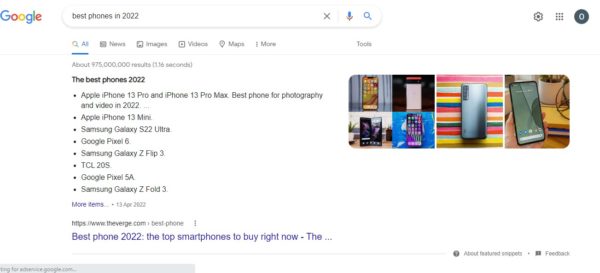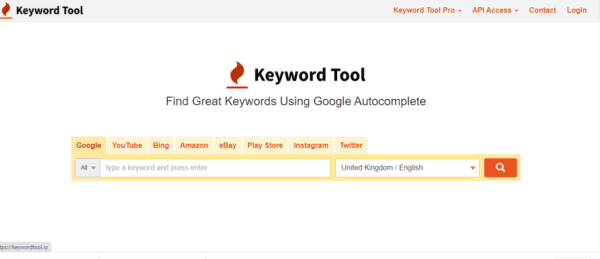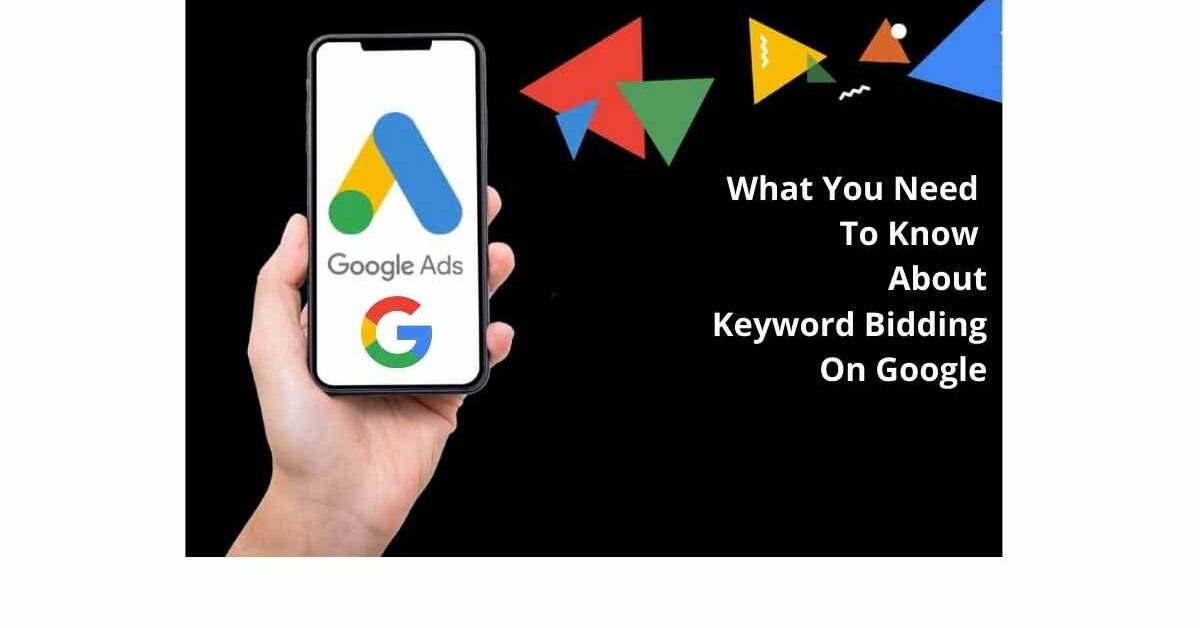Keyword bidding is a very important part of Google advertising you must pay attention to if you want your Ads to rank above that of your customers. When people are looking for solutions to problems or finding a product to buy, they turn to search engines (Google, Bing and Yahoo). When they search, they type in keywords and the search engine displays the most relevant options that meet their queries. This is where keyword bidding comes in. A lot of companies bid for a particular keyword to rank on the Google search result page. Meaning that the highest bidder gets to rank for a particular keyword. However, this just doesn’t happen, there are a lot of things involved when bidding for a keyword. Not to worry, in this article, we will take a look at everything you need to know about keywords but bidding.
What are Keywords?
Keywords are those words and phrases that people type into search engines to find what they’re looking for. They help describe what your website content is about. Website owners and SEO professionals use keywords to optimize a website’s content in hopes of ranking at the top of Google’s results and generating traffic. They also describe the product or service that you will be providing and determine when and where your ads are shown.
Anything that is searched on a search engine(Google, Yahoo or Bing) ranging from a word to phrase is considered a keyword. For example, here’s the results page for the keyword ” best phones in 2022.

Why are Keywords Important?
Keywords are very essential because they tell search engines about the content on your website. As a user performs a search query, relevant content can be served for those keywords, thus giving you traffic. It is the link between what people are searching for and the content you are providing to fill that need. As a business owner, your goal is to drive organic traffic to your website or landing page from search engine result pages, and the keywords you choose to target will determine what kind of traffic you get. If a page on your website shows up at the top of the results, the keyword it’s ranking for acts as a free source of website traffic for you.
Additionally, when advertising on Google, you can utilize pay-per-click (PPC) ads using specific keywords to rank above organic results. Here, advertisers bid for the space at the top of a results page for specific keywords.
How to Grow Traffic and Drive Revenue with Digital Marketing
Types of Keywords
1. Short-tail keyword
These are keywords that are made up of three words or less. They are also referred to as the head keyword. Short tail keywords have a huge amount of search volume and are highly competitive. These keywords are difficult to pinpoint their search intent because they are all around the place. For example, if someone is searching for wedding cakes or Swimming trunks.
It’s difficult to determine if the person wants to know how to swim or the advantages of swimming or just looking to get an idea of how much it cost for swimming. Additionally, short tail keywords don’t convert well because of the difficulty in matching searcher intent.
Characteristics
- High search volume
- High Competition
- Low conversion rate
- Broad search intent
2. Long-tail keyword
These keywords are much broader and more specific than short-tail keywords. They usually contain more than three words and have a much lower search volume compared to a short-tail keyword. But they make it up by being much less competitive. One advantage, it has over a short tail keyword is that it is much easier to pinpoint a long tail keyword’s search intent.
Characteristics
- High conversion rate
- low competition
- low search volume
- specific search intent
3. Short-term fresh keyword
They are fresh trending keywords that trend for a while and fade out eventually. This keyword rises with recent trends and is usually very explosive(has a large search volume). For example, the “crate challenge” trend generated millions of views worldwide.
Characteristics
- Explosive search volume(
- Specific search intent
- Medium competition
- High conversion rate
4. Evergreen Keyword
Evergreen keywords are those keywords that stand the test of time and are different from fresh keyword that fades away with time. The search volume might fluctuate now and then but there won’t be extreme changes. So when you use that evergreen keyword, there will always be somebody searching for that particular keyword.
Affordable Email Marketing: How To Start On A Budget
What is Keyword Bidding?
Keyword bidding is how you get your ad to appear at the top of the results page when someone searches for a keyword. It refers to the amount of money a marketer or advertiser is willing to pay on a particular keyword for a click-through. Keyword bidding works like an auction where advertisers bid for a particular keyword based on a particular score. How much you bid will determine the location of your ads within the search results pages (SERPs).
Think of keyword bidding like an auction where the winner gets to rank high on the Google search result page for a particular keyword. When a user searches for a particular keyword on Google, the search engine runs paid search results using its advanced algorithm and ranks them according to the bidders’ quality score for that keyword and how much their bid is.
When you run paid campaigns on Google, you don’t purchase keywords. You only participate in an auction that takes place every time a user searches for the keyword. So when running campaigns you have to choose your keyword carefully so you don’t waste money.
How does Keyword Bidding Work?
Google Ads remains one of the most popular pay-per-click advertising platforms in the world. Business owners and online marketers bid on specific keywords they want to use for their Google Ads. For each keyword or group of keywords (phrases), advertisers indicate a maximum cost per click (CPC) they are willing to pay for their ads to appear on the Google search engine result page when they search for that keyword. In addition to these, Google also estimates the quality of the ad and landing page in relation to the keyword. This is called the quality score(QS). Google determines the quality score through your CTR (Click Through Rate) and the landing page quality. Therefore the higher your CTR, the higher the ad quality.
For example, let’s say your Cost Per Click (CPC) Bid is $10 and your Quality Score is 4 your ad rank will be 40. If your competitor’s CPC Bid is $5 and their Quality Score is 20 their ad rank will be 100. This means that their ads will be displayed before yours, even though you are paying more money for them. Therefore at the time of the auction, the highest-ranking ad(100) will be shown on the search engine result page before the other ad(40) comes up. This is why it is important for you to improve your landing page and ad copy to improve your quality score.
Note that the amount you bid on your CPC is not exactly the price you will end up paying. From the above example, your CPC bid is $10, this is divided by the ad rank of the person below you by your Quality Score plus $0.01.
Google Keyword Bidding Strategies
Keyword bidding on Google or any other search engine is essentially a competitive game in which marketers and advertisers continuously optimize their strategies in an attempt to outrank each other. Google looks at factors such as your CPC bid, landing pages and quality score to determine your ranking. Your keyword bidding strategy will determine how well you will be able to outrank your competitors in the bidding auction. Here are some bidding strategies you can focus on to get the most out of your Google advertising.
1. Manual Bidding
This is one of the safest of Google’s bid strategies. It’s a good place to start. The purpose of this strategy is to maximize the number of clicks your ad gets. Manual bids are the best way to learn about how your advertising money is paying off. When you choose the manual bid strategy in your Google Ads platform, Google will give you a range for a suggested bid for each of your keywords. This will give you an idea of what bids have won previous auctions.
You can make use of the keywords planner tool like SEMrush Google keyword planner and keywords. io to help you research and select keywords for your campaign. Choose keywords that your target audience will use to look for a product or service like yours, and the Google Keyword Planner Tool will suggest a reasonable starting bid.
2. Automated Bidding Strategy
In this bidding strategy, Google automatically sets bids based on the ad’s likelihood to result in a click or a conversion. Automated bid strategies are those that use artificial intelligence to optimize your bids on your behalf, based on certain campaign goals you’ve set. There are several types of automated bidding strategies that can help you increase clicks, visibility, and conversions.
When you choose an automated bid strategy, here are a few recommended bidding strategies you can try
- CPC Bidding: This is a very simple keyword bidding strategy. If your goal is to generate website traffic, you can manually manage your maximum CPC bid by setting a bid for each ad or automatically maximizing clicks by setting a daily budget. With manual bidding, you can see which keywords or ads are performing best. Google automatically sets your bids to get as many clicks as possible within your budget if you use automatic bidding. This is measured by cost-per-click (CPC) and your goal is to have the lowest CPC possible.
- Target Return on Ad Spend (ROAS): This type of bidding helps you target an ROI which essentially means that you’re going after a particular sales amount rather than the number of sales. This bidding helps put your ads in front of audiences who are ready to buy your product.
- Target Search Page Location: This bidding is specifically for marketers that want to increase brand awareness and maximize visibility. To achieve this, you will have to target the top (or the first page, at least) of the search engine results page. Target Search Page Location automatically bids across multiple campaigns to show your ad at the top of the page or on the first page of SERPs.
- Maximize conversion: This bidding is for those that want to drive increase sales and drive more leads. Google automatically set your bids to help you get the highest number of conversions within your budget. This strategy helps drive higher conversion volume goals and automatically finds more people who are more likely to convert and bids higher on them
- Enhanced cost-per-click (ECPC): This is a type of bidding that can be applied to manual CPC that gives Google the freedom to increase or decrease your bids when it determines there’s more or less chance of a conversion. You can use this bidding to maximize conversions while generating traffic
The advantage of an automated bidding strategy is that it ensures that your bid is maximized for your goals.
What Is A Good Return On Ad Spend(ROAS)
Best practices for keyword Bidding
1. Improve Your landing page
A landing page is a stand-alone page that is designed to convert visitors into leads. It is a page where a visitor who clicks on a link in your ad lands. This page must be optimized for user experience. Google wants to ensure that your content directly aligns with your ad copy, how you present your page, and of course, answers the query it targets. Furthermore, your landing page must be optimized for mobile devices and the page speed must be optimized. Overall your landing page must be relevant to your ad.
2. Make use of keywords research tool
We have established that keyword is very important when it comes to Google ads. Therefore, you need to do thorough research when choosing keywords. There are various tools that can help you choose the right keyword for your product and services. This tool includes SEMrush, Google Trends, Keywords.io, keywords everywhere, Ubersuggest and many more.
3. Use negative keywords
Negative keywords are terms and phrases that you don’t want your ads to show for. By including those keywords in your campaign, you are telling Google to skip these items when showing your ads. telling. It s more like ” Google, don’t waste my budget on these terms”. For example, if your target keyword is “running shoes” and your ad appeared for “Summer running shoes” you can turn “Summer” into a negative keyword, so you only attract visitors willing to purchase your products or services.
Some Keywords generating Tool
1 Keywordtool.io

This is a keyword research tool that you can use to research keywords for your product and services. Keywordtool comes with up to 750 long-tail keywords for any search made. It is a web-based keyword software and marketing tool that uses the Google Autocomplete feature to generate keyword suggestions for you. Keywordtool can be used to see top related searches on your keywords, trending keywords and questions on YouTube, Bing, and also in mobile app stores. Once you start getting keywords idea, you can use those keywords for content marketing, PPC campaign management, search engine optimization, and even social media advertising.
2. Google Trend
Google Trends is another keyword tool used by online marketers to research keywords and topics for PPC campaigns, social media marketing and even blogs. It is used to understand the popularity of a search term or topic on the Google search result page. With Google Trends, you can understand how popular a keyword, search term, or topic is on the search result page. With this keyword tool, you can easily find the highest-ranking keywords and industry-related topics based on how people are searching for those keywords. Additionally, this software can be used to see how a particular topic has trended over time and use this data and insight to create content around topics that are relevant in their industry.
3. SEMrush

SEMrush keyword research tool is also a great tool that can help you come up with quick content ideas for your PPC campaigns, product and service keywords, blogs and social media platforms. To get started, you have to enter a keyword or phrase and target location, and then SEMrush provides you with potential ideas around that main topic. The SEMrush topic research tool makes it very quick and easy to get potential ideas around your core topic in just minutes. Just enter a subtopic and see related articles and questions being asked in real-time.
Conclusion
Keyword bidding is an essential part of PPC campaigns. So marketers have to pay close attention to it because it could determine whether your ads get to the right people or produce the right results or not. When you are bidding for keywords on search engines, you have to take note of your keyword targeting, your ad creativity, and the customer experience. Always monitor and adjust bidding to find out the best one that is working for you. Understanding Keywords and PPC will allow you to run a successful Google Ads campaign.
With the right and relevant keyword, you will be able to create the best ad campaign possible for your audience. This ad will be able to reach an even bigger audience once you take care of your Quality Score.






